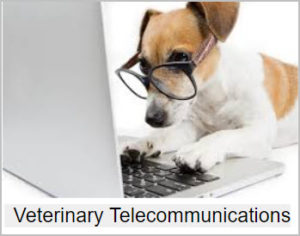I appreciate the (mostly volunteer) efforts of veterinary state examining boards to protect competent veterinarians and the public from veterinary malpractice. Many boards are now wrestling with wording the post-Covid “Veterinary Client Patient Relationship” (VCPR). There is a tendency to insert phrases like “in-person” and “hands-on” to differentiate clinical and televeterinary practice. However, traditionally if Dr. A completes a “hands-on” exam on Monday but is off Tuesday, Dr. B answers the telephone and with new information, correctly modifies any or all of the diagnosis, prescription, and treatment plan. There’s more.
It is in the public’s interest if overwhelmed with cases, Dr. C have the option to incorporate Teletriage or a televeterinarian to consult on every component that doesn’t require touching the animal. In a different scenario, if Dr. X has the time, but not the expertise, the animal benefits from a remote Veterinary Microspecialist (anywhere) consulting directly with the owner, then managing some portion of the case under the indirect supervision of Dr. X. Veterinary specialists could share their expertise nationally or internationally. One concern is any state board writing medical standards for an entire state when the standard of care varies depending on locale, finances, etc.
Here are my suggestions for every American State Veterinary Board:
- Retain or enhance the authority to fine, prosecute, suspend, or revoke the license of any veterinarian delivering services below the applicable standard of care.
- Aggressively prosecute those “practicing veterinary medicine without a license.”
- Require both CE and (as needed) participation in “Standard of Care” peer reviews (like jury duty) to consider context-specific accusations of malpractice.
- Standardize on the federal VCPR wording since the FDA and DEA have jurisdiction over all drug prescription anyway.
- Recognize a Federal “Secondary” or “Televeterinary” client patient relationship, (permitting remote Dx and Rx) as long as there is a primary VCPR already in place.
- Allow, but hold the Attending DVM responsible for vetting any contracted teleconsultant, keeping each responsible for their own work.
- Cooperate with a federal response to interstate or international individuals providing “direct to consumer” veterinary advice without a local attending VCPR.
HERE is a link to article from over 4 years ago where I gave an expanded perspective.
Rolan
